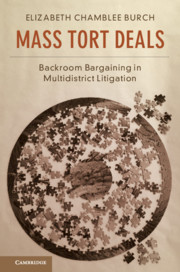Refine search
Actions for selected content:
3 results
8 - Toward the Participatory MDL
- from Part II - Legal Tech, Litigation, and the Adversarial System
-
-
- Book:
- Legal Tech and the Future of Civil Justice
- Published online:
- 02 February 2023
- Print publication:
- 09 February 2023, pp 173-196
-
- Chapter
-
- You have access
- Open access
- HTML
- Export citation

Mass Tort Deals
- Backroom Bargaining in Multidistrict Litigation
-
- Published online:
- 16 May 2019
- Print publication:
- 16 May 2019
Introduction
-
- Book:
- Mass Tort Deals
- Published online:
- 16 May 2019
- Print publication:
- 16 May 2019, pp 1-7
-
- Chapter
- Export citation
